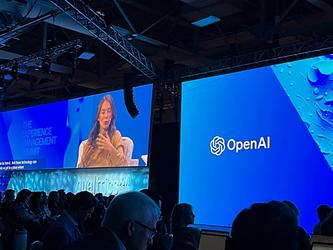OpenAI develops enterprise-level version of ChatGPT

ChatGPT Enterprise offers users more security and privacy, OpenAI claimed in a blog post.
ChatGPT launched at the end of 2022, and according to the company’s own data, 80% of Fortune 500 companies have a corporate email address registered with a ChatGPT account.
The company said: “We've heard from business leaders that they’d like a simple and safe way of deploying it in their organisation.”
The enterprise tool will offer “higher-speed” GPT-4 access, longer context windows for processing inputs, and advanced data analysis that OpenAI said would allow teams to analyse information more quickly.
OpenAI said it is “onboarding as many enterprises as we can over the next few weeks”.
Businesses across the insights sector have adopted generative AI since the launch of ChatGPT, followed by Google’s Bard.
There have been broad concerns across industries over the privacy of the technology – for example, that organisations’ data and customer information could be used to train ChatGPT.
Researchers have also expressed concerns over the impact of generative AI technology at a societal level, as well as AI introducing bias in research results through aggregation of verbatim data.
OpenAI stated that in the new business version of its AI assistant, users “own and control” their “ business data” and that the company does not train based on this data or conversations. The company also said ChatGPT Enterprise is SOC 2 compliant.
In April, the Information Commissioner’s Office (ICO)’s executive director for regulatory risk published a blog post reminding UK organisations that if they use or develop generative AI, they should consider data protection obligations from the outset.
The regulator also noted that personal information taken from public sources still must consider data protection law.

We hope you enjoyed this article.
Research Live is published by MRS.
The Market Research Society (MRS) exists to promote and protect the research sector, showcasing how research delivers impact for businesses and government.
Members of MRS enjoy many benefits including tailoured policy guidance, discounts on training and conferences, and access to member-only content.
For example, there's an archive of winning case studies from over a decade of MRS Awards.
Find out more about the benefits of joining MRS here.














0 Comments